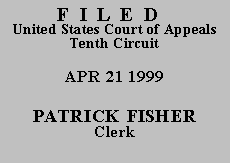

| UNITED STATES OF AMERICA,
vs.
DWAYNE BUFORD REED |
|
On appeal, Mr. Reed argues that the one-year limitation period should run from the Supreme Court's decision in Muscarello v. United States, 118 S. Ct. 1911 (1998), because that decision clarified the meaning of "carry" in § 924(c) and amplified Bailey. See § 2255(3). He also seems to argue that he could not have discovered the facts for his claims without the guidance provided by Muscarello, an untenable assertion. As noted by the district court, Muscarello did not recognize any new right and Mr. Reed's motion predates it by several months. See R. doc. 106 at 6. Moreover, Mr. Reed's claims have been procedurally defaulted for failure to raise them on direct appeal. See Bousley v. United States, 118 S. Ct. 1604, 1611 (1998). We therefore deny his application
for a certificate of appealability.
APPEAL DISMISSED.
Entered for the Court
Paul J. Kelly, Jr.
Circuit Judge
*. This order and judgment is not binding precedent, except under the doctrines of law of the case, res judicata, and collateral estoppel. This court generally disfavors the citation of orders and judgments; nevertheless, an order and judgment may be cited under the terms and conditions of 10th Cir. R. 36.3.
**. After examining the briefs and the appellate record, this three-judge panel has determined unanimously that oral argument would not be of material assistance in the determination of this appeal. See Fed. R. App. P. 34(a); 10th Cir. R. 34.1 (G). The cause is therefore ordered submitted without oral argument.